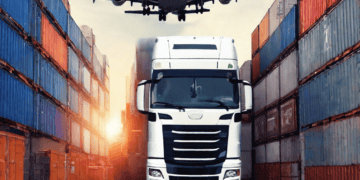In recent discussions within the logistics industry, there has been a growing emphasis on the integration of technology, particularly machine learning, to enhance operational efficiency. Numerous tech leaders have underscored the significance of embracing forward-thinking digital strategies to expedite processes and maintain a strong focus on customer needs.
In response to the challenges posed by the COVID-19 pandemic and ongoing market demands, logistics companies are increasingly turning to technological solutions to streamline their operations. Achieving complete digitization across the supply chain has emerged as a primary objective for many within the industry.
Despite concerted efforts to advance digital initiatives, the complexity inherent in the logistics sector—comprising integrators, forwarders, and owners—has resulted in fragmented processes across the supply chain. To address this, Scale AI has initiated collaborations with logistics firms to automate various processes effectively. Leveraging machine learning, Scale AI aims to simplify integration procedures, commercial invoicing, document processing, and other logistical operations.
Machine learning, a subset of artificial intelligence, enables applications to forecast outcomes without explicit programming for each prediction. In the logistics realm, historically reliant on extensive paperwork, technologies like optical character recognition (OCR) and template-based intelligent document processing (IDP) have been utilized. However, these methods often necessitate human input for data extraction, leading to time-consuming processes and reduced accuracy.
Melisa Tokmak, General Manager of Document AI at Scale, stresses the urgency for logistics firms to embrace advanced technologies. She highlights the limitations of conventional techniques reliant on manual inputs and emphasizes the necessity of transitioning to machine learning-driven systems for rapid, accurate data processing, ultimately enhancing customer experiences and operational efficiency.
Scale’s approach involves building and fine-tuning machine learning models using minimal document samples provided by clients, eliminating the need for templates and ensuring swift and precise document processing without human intervention. This streamlined method contrasts with traditional systems by comprehending document layouts, hierarchies, and contextual meanings.
Tokmak emphasizes that current OCR and IDP technologies fall short of meeting industry requirements, advocating for collaborations with entities like Scale to integrate machine learning into logistics processes. She affirms that this transition can equip companies with enhanced market insights, global trade visibility, and the potential for pioneering new technologies.
One such company benefiting from this shift is Flexport, a prominent player in the logistics sector adopting a digital-forwarder approach. Facing challenges with traditional data extraction methods, Flexport partnered with Scale AI to enhance its operational efficiency in global trade. The integration of machine learning enabled Flexport to process information swiftly and accurately, notably extracting estimated times of arrival (ETAs) to provide users with enhanced visibility.
Tokmak envisions a future where logistics companies leverage technology resembling a knowledge graph, facilitating informed decision-making and seamless operations. She terms this concept a “global trade knowledge graph,” encompassing data on trade movements, sensor information, and operational insights to deliver optimal user experiences.
While acknowledging the gradual nature of this technological transformation, Tokmak underscores the importance of prioritizing areas that offer the highest return on investment for companies. She affirms that machine learning, particularly in document processing, presents a high-value solution, reducing costs, minimizing delays, and establishing a singular source of truth within organizations.
Despite initial reservations, there is a growing recognition within the industry regarding the distinctive advantages of machine learning technologies. Companies increasingly understand the potential of machine learning in driving efficiency and are eager to capitalize on its benefits to achieve significant advancements in their operations.
Get the newest updates in supply chain logistics news on The Supply Chain Report. Visit ADAMftd.com for free international trade tools.
#GlobalSupplyChains #LogisticsTechnology #MachineLearning #DigitalTransformation #ScaleAI #Flexport #LogisticsEfficiency #TechInLogistics #SupplyChainOptimization #FutureOfLogistics #DigitalForwarder #TradeVisibility #OperationalExcellence #AIinLogistics #GlobalTrade #SupplyChainInnovation















